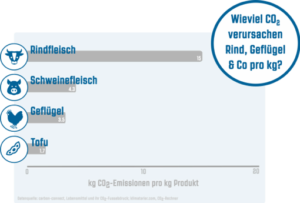Savouring as opposed to over-indulging, that should be the motto when eating meats. After all, if you eat meat infrequently but with more enjoyment, you can easily make a big contribution to climate protection.
What can you do?
- Buy locally sourced meats with shorter transport distances.
- Buy organic meats.
- According to Eaternity, organic meat is responsible for a higher than average emission of CO2 equivalents* per kg than conventionally produced meat, but it scores better in other environmentally relevant criteria. For example, with “Bio Suisse” certified meat, it is guaranteed that the animal fodder comes from Switzerland or Europe and is not grown in tropical regions (e.g. the Amazon).
- If you must eat meat, poultry or pork are better choices, because their impact on the environment is lower than that of beef’s.
- Eat vegetarian meals more often.
- Inspiration for vegetarian dishes can be found on the websites of Tibits, Fooby or in the new cookbook “Greentopf“.
Additional Information
According to the Swiss Federal Office for the Environment, food production is responsible for around one-third of Switzerland’s total environmental impact**, 25% of which is attributable to the consumption of meat and fish. Hence, the Confederation views food consumption, in particular animal vs. plant-based foods, as providing great potential for optimising our environmental impact. The meat industry is one of the world’s biggest emitters of greenhouse gases. On the one hand, meat producers convert fertile land and rainforests into agricultural land for the cultivation of animal feed. On the other hand, animals, especially cows, emit large amounts of greenhouse gases, such as methane. Additionally, with the consumption of meat on average at 50 kg per year (Agricultural Report 2017), we exceed by three times the 14 kg recommended by the Federal Office for Food Safety and Veterinary Affairs. If you adhere to the official recommendations, you can save 246 kg of CO2 per year – equivalent to the carbon dioxide stored by 20 trees annually (swissclimate.ch). The type of meat is also relevant. For example, the numbers for beef consumption are only half that of pork. Nevertheless, according to carbon-connect, national beef consumption generates more CO2 than pork consumption. Poultry is the most eco-friendly of the livestock meats.
Under ClimateMenu one can find numerous simple and climate-friendly recipes. In addition, myblueplanet regularly organises a cost-free, climate menu for lunch. So, it’s worth checking our events page on a regular basis.
* CO2 equivalents: In addition to CO2, there are other gases that contribute to the greenhouse effect. However, these differ from CO2 in the length of time they remain in the atmosphere and their effect on the climate. To simplify the comparison of different greenhouse gases, their emissions can be converted into CO2 equivalents. For example, 1 kg methane has the same effect on the climate as 25 kg CO2 (IPCC,2014). 1 kg methane therefore corresponds to 25 kg CO2 equivalents.
** The assessment of the environmental impact is based on the method of ecological scarcity. “According to the Swiss Federal Office for the Environment, the central parameters of the method are the eco-factors (including CO2, air pollutants or land use), which indicate the environmental impact of a pollutant emission or resource extraction in the unit environmental impact points (UBP) per unit of quantity. In determining the eco-factors, the current emission situation on the one hand and the Swiss or international targets supported by Switzerland on the other, play a major role”. According to Carbotech, 1000 UBP correspond to the pollution caused by a 3 km car journey.



